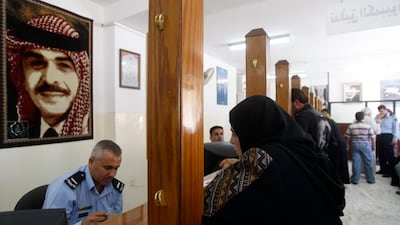Jordanian authorities will release 503 prisoners jailed under a 1954 law that allows people to be detained without charge.
For decades, human rights organisations have denounced the legislation, called the “crime prevention law”, as arbitrary and undercutting the judicial system.
State television said that Interior Minister Mazen Al Faraya told governors to release the 503 so-called administrative detainees before Eid Al Adha next week “after making sure that once free, their release “does not constitute a danger to the general security and order”.
Mr Al Faraya said authorities want to give the freed prisoners the chance to “integrate in society and practise normal life”.
The authorities did not release any information on the identity of the prisoners or how long they have been in jail.
Under the law, governors and other administrative officials can order the arrest of people on grounds that they constitute a public danger, are about to commit a crime, or are “habitual thieves”.
Officials say administrative detention is necessary to prevent crime and disturbances, such as revenge in tribal disputes.
The law was enacted during political upheaval in Jordan. King Hussein, father of the current King Abdullah, was consolidating power.
All significant powers in Jordan are with King Abdullah, who assumed the throne in 1999.
The authorities have been putting more people in administrative detention since the economy started retreating 14 years ago and more crimes were being reported, particularly on the outskirts of Amman and in other outlying areas.
The increased use of the measure also coincided with a crackdown on dissent in Jordan.
Thousands in 'administrative detention'
Assem Al Omari, a veteran human rights lawyer, said between 2,000 and 3,000 people are under administrative detention in Jordan.
Official figures show that there are 21,000 prisoners in Jordan, compared with a prison capacity of 13,500.
Mr Al Omari said the decision to release the 503 was made to free up prison space rather than to signal any reforms.
“The jails are overcrowded,” Mr Al Omari said. He said some members of the pro-government parliament have been seeking the release of people from their constituencies.
The 130-member parliament mostly comprises members of tribes and clans who constitute a bedrock or support for the political system.

